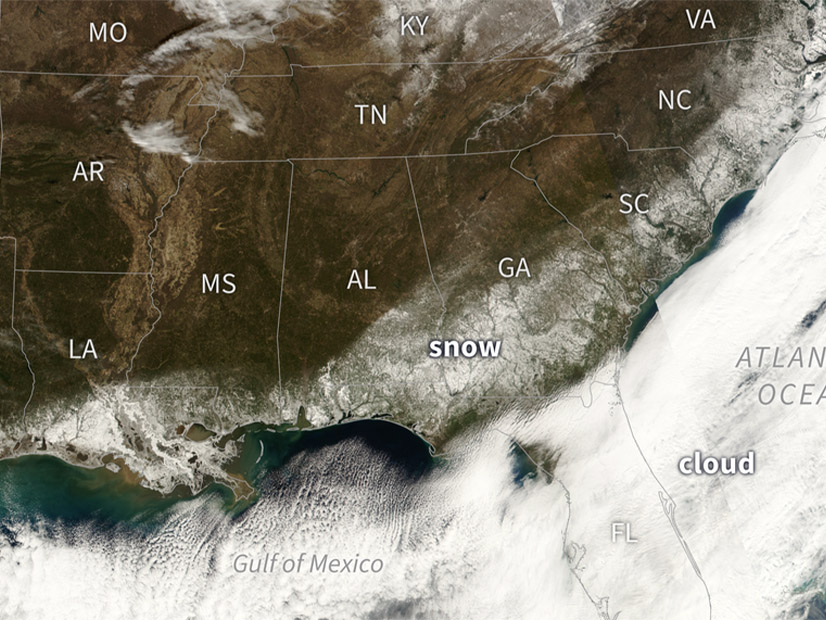
FERC and NERC applauded the performance of the North American electric grid during recent periods of extreme cold weather that deposited snow and ice across much of the Southeastern U.S. this January while promising a deeper review of the events to see what worked in the energy system and what didn’t.
Low temperatures blanketed the South on Jan. 19, fueled by what the National Oceanic and Atmospheric Administration described as an “Arctic blast” and a “deep trough” of Arctic air. (See NERC Pushes Cold Weather Prep as ‘Trough’ Approaches.) Cities as far south as Louisiana reported extreme low temperatures, with New Orleans hitting 26 degrees Fahrenheit on Jan. 22, the same day that Lafayette saw 4 F and New Iberia reported 2 F — record lows for all three.
Cities across the South also broke snowfall records: Mobile, Ala., received 7.5 inches and Pensacola recorded 10 inches on Jan. 21, and Fernandina Beach, Fla., had 4 inches on Jan. 22. NOAA said some “sites have recorded more snow so far this winter season than many locations far to the north, including Chicago.”
However, despite the severe cold, NERC and FERC said in a press release that the grid “operated without any major incidents [and] with no major fuel system disruptions impacting electric generation.” Before the icy weather arrived, the ERO had called on utilities to take necessary steps “to ensure the highest levels of reliability,” expressing particular concern about the supply of natural gas for electric generation.
NERC and FERC will join with the regional entities to review the grid’s performance during January’s cold weather, the release said. Areas of focus will include winter preparation activities by the electric and gas industries, any changes since the winter storms of 2021 and 2022 that impacted grid performance, and “additional opportunities to enhance winter operations.” The commission and the ERO undertook a similar review following last year’s Arctic storms. (See FERC, NERC Review January Winter Storm Performance.)
FERC Chair Mark Christie said he looked forward “to learning more about what worked well during very challenging winter conditions,” while NERC CEO Jim Robb said he hoped the review would “help inform both gas and electric industry actions in anticipation of future cold weather events, which are occurring with alarming frequency even during otherwise-mild winters.”
The ERO said it expects to discuss a summary of the review at a FERC open meeting this spring, prior to the release of a full report.
NERC warned in its 2024-2025 Winter Reliability Assessment that multiple regions face elevated risk of energy shortfalls during extreme winter conditions extending over a wide area, including parts of Texas and SERC Reliability that were hit by January’s storms. The ERO cited rising demand and retirements of thermal generation capacity as contributing to slimmer reserve margins across the continent.
Winter weather has been a growing concern for NERC after several severe storms in recent years caused widespread generation outages. FERC and NERC’s final report on Winter Storm Elliott of December 2022 said the bomb cyclone caused an “unprecedented” amount of generation failures, reaching more than 90 GW in coincident unplanned outages, with most of the entities that shed load located in the Southeast. (See FERC-NERC Elliott Report Calls Winter Outages ‘Unacceptable’.)



